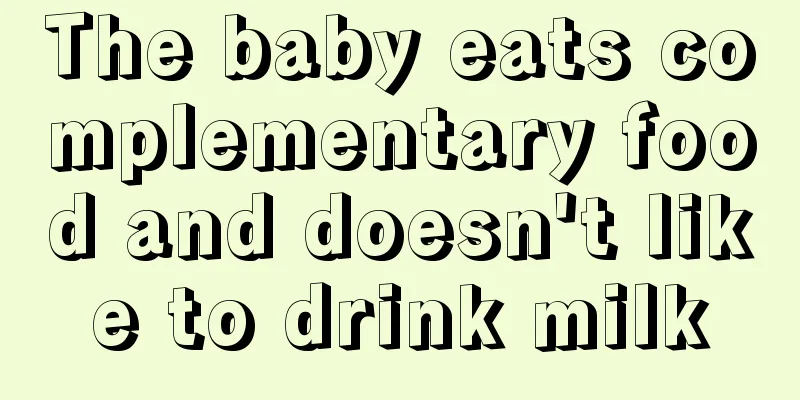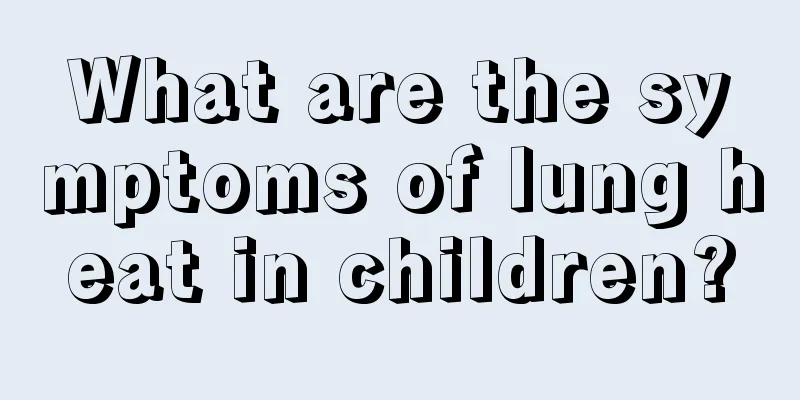Can baby's overeating cause fever?

|
The baby's gastrointestinal system is not yet fully developed, so if the diet is improper, various problems will occur. For example, food accumulation is a symptom caused by the baby taking in too much food and not being able to digest it in time. Indigestion can cause a variety of discomfort symptoms to the baby. If the condition is serious, it may even cause the baby to have a fever. Next, I will introduce to you the relevant knowledge about baby's food accumulation. 1. Symptoms of indigestion in children Indigestion in children can cause persistent high fever. This is because if indigestion persists for a long time, it will accumulate and turn into heat, causing fever. In addition, indigestion will lead to further decline in spleen and stomach function and decreased resistance, and once affected by external evil, it is easy to have a fever. It is reported that young children have symptoms of indigestion and fever. Children with indigestion often have a thick and greasy tongue coating, especially the middle part of the tongue. They also have symptoms such as a bad taste in the mouth and abdominal distension after eating. Infant and child doctors point out that paying attention to the following small details can help determine whether the baby has food accumulation: 1. The baby keeps turning over and over during sleep and sometimes even grinds his teeth. 2. The baby's appetite, which had been very good recently, has shrunk again, and his appetite is obviously poor. 3. You will find that the sides of the baby's nose are blue and you can smell a sour and rotten smell in his breath. 2. Methods to reduce fever caused by food accumulation in babies 1. Physical cooling: Apply a towel soaked in warm water to the baby's forehead to help cool the baby down. To save trouble, you can also use a cooling patch on your baby's forehead, which can last for about 8 hours. 2. Give your baby more water: When a baby has a fever, his body is relatively deficient. If you can replenish your baby with water in time, it will help your baby reduce the fever as soon as possible. 3. If the baby's fever reaches 38.5 degrees or above, you need to give the baby antipyretics. This should only be taken as a last resort, otherwise do not give your baby any fever-reducing medicine. 3. Solutions to baby's food accumulation 1. Give your baby some stomach-strengthening and digestion-promoting tablets. Giving your baby stomach-strengthening and digestion-promoting tablets half an hour after meals every day can effectively relieve the baby's symptoms of indigestion, nourish the stomach and stimulate the appetite. 2. Eat light vegetables rich in crude fiber and less greasy food. Babies with indigestion should eat more vegetables, because vegetables such as celery and rapeseed are rich in crude fiber which can speed up food digestion. 3. Increase your baby’s activity level. It is better to let your baby move more and rely on his own gastrointestinal activity to digest food. It can exercise and enhance the baby's digestive function. |
<<: Baby has hemangioma on finger
>>: What food should children eat when they have a high fever
Recommend
Why is my baby breathing heavily?
Babies always breathe heavily. Generally speaking...
What is glaucoma in children?
As electronic screens become more and more common...
Causes of joint cracking in children
If we observe the physical development of childre...
3-year-old baby height and weight
When the baby reaches the age of three, his weigh...
Treatment and care of baby ADHD
ADHD is a very common disease. Many parents and t...
How many months can babies take cod liver oil?
For new parents, the arrival of a baby brings too...
What to do if children accidentally swallow chewing gum
Chewing gum, a product we use to clean our mouth....
Lutein Supplement for Children
Lutein is present in large quantities in many fru...
What are the developmental standards for babies at 14 months?
For every parent, they are particularly concerned...
Does the baby need to add water to orange juice?
Nowadays, many parents are very concerned about t...
Should children take anti-inflammatory drugs if they have a fever of 385?
It is a very common phenomenon for children to ha...
Should newborns sleep with pillows?
Pillows are very important sleeping tools in peop...
Why is my baby's urine cloudy?
Many people think that urine is disgusting, but m...
Early signs of anorexia in teenagers
Anorexia is a psychological disorder in which a p...
What should children with alopecia areata eat?
In today's life, the incidence of diseases is...









